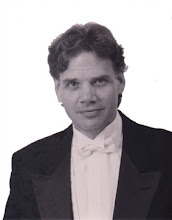A student walks into my office and begins her exam: "tap this rhythm while you count the meter, one, two three." She messes up in measure four; just can't keep the beat. "OK, try it again; notice that the third beat goes like this . . ." On to pitch: "use your tuning fork and find an E flat from A 440, then sing an E Flat Major scale." Again, some difficulty, another repetition, some improvement. (Finding E Flat Major from the pitch A can be difficult; give it a try). Each student who comes in for their exam has some special difficulty -- call it a disability. How do these encounters have anything to do with the humanities or with technology? In teaching basic musical skills, we are directly confronted with human capability. So much of our experience today is mediated through technology, but the technological aids do not remove the necessity of developing our individual abilities. I teach basic musical skills in addition to conducting choirs, teaching composition, and teaching electronic music. In all these endeavors, I'm struck by the fact that the spectacular development of technology necessitates not less, but more attention to our individual skills, our actual human embodiment. There are many technological aids for teaching musical skills, and I try to make use of as many as I can. For students who have trouble matching pitch, for instance, the "Magic Keyboard" app on the iPhone can show the students immediately what pitch they are singing, and can literally help them find their voice. --But the task of finding your voice remains, and it takes individual effort and attention. The technology doesn't take away the human need and desire for embodying music, for making music on our own. As I think about what it is that the study of music gives us, part of the answer seems to be this individual ownership, this personal involvement.
In the 20th century, a certain modernist trend in music presupposed that the human organism would develop in a way that paralleled the stunning progress in technology. We began to think that people would walk around humming 12-tone melodies because the human organism would somehow become more capable--just as the passenger jet replaced travel by ocean liner. It's a ludicrous thought when it is expressed so openly, but nonetheless it was an underlying assumption for many, many decades. The field of choral music, my field, definitively disproves this idea that human capability will develop in tandem with technology. Although a professional orchestra, with the technology, so to speak, of highly developed instruments, is capable of producing complex, rhythmically irregular, atonal music, choral singers, professionals or amateurs alike, relying solely on their bodies without technological assistance, have enormous difficulty in performing disjunct melodies that have a rapidly changing scale (or what some call a rapidly changing macroharmony). This inability is not due to any conservatism on the part of choral organizations, or a general lack of ambition (even if orchestral musicians may suspect that this is the case); it is surely part of an unchanging characteristic of our organism. Call it part of our humanity. So as a choral conductor, I am directly confronted with issues of humanity, of human limitations. The issue simply can't be avoided; sometimes it can be ameliorated, but it can never be sidestepped by technological development. We use technology in so many ways to enhance our art, but it is delusional to think that technology can transform human capability itself. This is one contribution among many offered by music-making (that is, not just passive listening, but the challenging endeavor of making music ourselves): it helps to develop individual agency; it helps to develop skills at a time when it is very likely that technological development, despite its great usefulness, can easily lead to an unfortunate decline in independent human capabilities.

